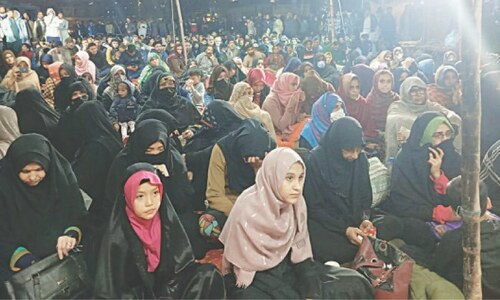KARACHI: A book titled Pakistan’s Relations with Saudi Arabia by former ambassador Shahid Amin was launched at the Institute of Business Management (IoBM) on Saturday afternoon.
Speaking on the occasion, former senator and information minister Javed Jabbar said the book was truly a distinguished contribution to a very limited range of literature on the subject. “What better gentleman to do this than Mr Amin because in addition to his services to the country and the Foreign Office, he has written regularly and extensively, and noblest of all, he is a teacher.
“The book is more than what its prosaic title suggests. As I read it, for example the introduction, he goes into detail about Persia and Iran; and even in that relatively brief introduction, the author sets the stage for what’s to come because no country is a cocoon.”
Book on bilateral relations with the kingdom launched
Mr Jabbar said there are three principal thought-provoking facets of the book. The first is that the Pakistan-Saudi Arabia relationship is an inextricable one. We are bound by religion, and we are also bound by region, even though we are not immediate neighbours. This inextricability is best narrated by Mr Amin as how King Abdullah related to two Pakistani leaders of completely contrasting characters — Nawaz Sharif and Gen Musharraf. To each of them King Abdullah extended support, empathy, understanding and hard cash. “It shows that bilateral relations are also shaped by individuals.”
The second facet, he said, is that it’s a very lopsided relationship. The author has quoted a Saudi ambassador to Washington DC saying we’re very much part of what’s happening in Pakistan — an outright admission by a diplomat. “Can you ever expect Pakistan to start intervening in Saudi Arabia’s internal affairs? Out of the question.”
Mr Jabbar said the third facet is that there’s ambiguity in the relationship, despite the fact that it’s an inextricable one, particularly for the future. “How are Saudi-Pak relations going to evolve vis-à-vis Iran, India and Israel? We know that the UAE, Bahrain and Oman are opening up to Israel. It is obviously being done with tacit approval of Saudi Arabia. Will Pakistan be obliged to do what their Arab brethren will do? We don’t know.
“How is the relationship going to evolve vis-à-vis India? Is Saudi Arabia ever going to endorse Pakistan’s extremely tough condition of no talks until you take back what you did on Aug 5, 2019?”
After mentioning the three points, he went on to describe the commonalities and contrasts that the two countries have.
Former special assistant to Prime Minister Dr Ishrat Hussain said he learned a lot from the piece of work that Mr Amin has produced. He lauded the effort of the institute where the launch was taking place in bringing out the book. The second thing that he emphasised in the first part of his talk was, “We have to look at the relationships with other countries as a reflection of our internal strength. Your foreign policy is in fact a reflection of your domestic policy. And Mr Amin points out that when Saudi Arabia was nothing like it’s today, Pakistan was providing them the expertise in order to carry out normal governance of the country.”
Dr Hussain in the latter half of his address highlighted the messages coming out of the relationship that he has learned from the book. The first was that in 1974 Saudi Arabia became a global power because the oil prices went up. The second was that Saudi Arabia became a regional power through OIC, GCC and the Islamic Development Bank. And the third, he said, was the basic theme of the book: bilateral relations. The author has pointed out that despite billions of dollars in equipment and training of their personnel, Saudi Arabia is still dependent on Pakistani military. It started in the 1960s and reached its peak in the 1980s. The Royal [Saudi] Air Force was trained by Pakistan Air Force pilots. “Yes, we have seen ups and downs in the relationship, but compared to other countries the ups have been more than the downs.”
Introducing the book, Mr Amin said it was a project of Mr Shahjehan Karim, the founder of IoBM.
Earlier, Talib Karim and Bashir Janmohmmad also spoke. Retired ambassador Alam Brohi delivered the vote of thanks.
The event was organised by IoBM in collaboration with the Pakistan Council on Foreign Relations.
Published in Dawn, September 19th, 2021















































Dear visitor, the comments section is undergoing an overhaul and will return soon.